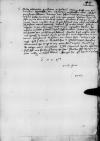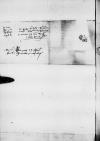Doleo vehementer, quod nescierim te Ghent (Gent, Gand, Gandavum), city in the Low Countries, the County of Flanders, today in Belgium⌊GandauumGhent (Gent, Gand, Gandavum), city in the Low Countries, the County of Flanders, today in Belgium⌋ venturum fuisse ante hos dies sacros,[2] exspectassem orig. expectassem⌈exspectassemexspectassem orig. expectassem⌉ enim neque tantum accelerassem reditum, sed spem, quam semper habueram, ademerat mihi illustrissimus Johann Albrecht of Brandenburg-Ansbach (Johann Albrecht von Hohenzollern) (*1499 – †1550), son of Friedrich V, Margrave of Brandenburg and Sophia, daughter of Casimir IV Jagiellon, King of Poland; brother of Albrecht I von Hohenzollern Duke in Prussia; 1545-1550 archbishop of Magdeburg and bishop of Halberstadt ⌊marchioJohann Albrecht of Brandenburg-Ansbach (Johann Albrecht von Hohenzollern) (*1499 – †1550), son of Friedrich V, Margrave of Brandenburg and Sophia, daughter of Casimir IV Jagiellon, King of Poland; brother of Albrecht I von Hohenzollern Duke in Prussia; 1545-1550 archbishop of Magdeburg and bishop of Halberstadt ⌋ transacturum te dicens Pascha Antwerp (Antwerpen, Antverpia), city in the Low Countries, from 1315 a Hanseatic port, in the 16th century the centre of Brabant’s artistic life and the wealthiest trade city in Europe, today in northern Belgium⌊AntwerpiaeAntwerp (Antwerpen, Antverpia), city in the Low Countries, from 1315 a Hanseatic port, in the 16th century the centre of Brabant’s artistic life and the wealthiest trade city in Europe, today in northern Belgium⌋, quod mihi vero orig. vaero⌈verovero orig. vaero⌉ propius videbatur. Ex quo autem Charles V of Habsburg (*1500 – †1558), ruler of the Burgundian territories (1506-1555), King of Spain as Charles I (1516-1556), King of Naples and Sicily, King of the Romans (1519-1530), Holy Roman Emperor of the German Nation (elected 1519, crowned 1530, abdicated 1556); son of Philip I the Handsome and Joanna the Mad of Castile⌊caesarCharles V of Habsburg (*1500 – †1558), ruler of the Burgundian territories (1506-1555), King of Spain as Charles I (1516-1556), King of Naples and Sicily, King of the Romans (1519-1530), Holy Roman Emperor of the German Nation (elected 1519, crowned 1530, abdicated 1556); son of Philip I the Handsome and Joanna the Mad of Castile⌋ non ita brevi venturus est Ghent (Gent, Gand, Gandavum), city in the Low Countries, the County of Flanders, today in Belgium⌊GandauumGhent (Gent, Gand, Gandavum), city in the Low Countries, the County of Flanders, today in Belgium⌋, quid oberit, si 1531-04-16⌊cras1531-04-16⌋ Bruges (Brugia, Brugge), city in the Low Countries, in the County of Flanders, in the 13th-15th centuries one of the most important commercial ports and trading centres in Europe, today in Belgium⌊hucBruges (Brugia, Brugge), city in the Low Countries, in the County of Flanders, in the 13th-15th centuries one of the most important commercial ports and trading centres in Europe, today in Belgium⌋ ad nos venias, itinere non adeo longo et quod sex horis etiam pedes quis absolvat?[3] Idque ut facias, oramus vehementer.
Visurus es, ut alia omittam, globum magnum[4] et quo nullum maiorem vidisti umquam orig. unquam⌈umquamumquam orig. unquam⌉ neque tam bene depictum. Ego rursus te comitabor Ghent (Gent, Gand, Gandavum), city in the Low Countries, the County of Flanders, today in Belgium⌊GandauumGhent (Gent, Gand, Gandavum), city in the Low Countries, the County of Flanders, today in Belgium⌋, cumprimum Radom (Radomia), town in east-central Poland, Masovia, 100 km S of Warsaw⌊caesarRadom (Radomia), town in east-central Poland, Masovia, 100 km S of Warsaw⌋ advenerit. Interea non deerunt alia spectatu digna, quibus tempus fallemus. Proinde, si quid possunt preces meae Elisabeth Donche (Anna Isabella Donche, Isabeau) (†1549), from 1528 wife of Cornelis De Schepper, mother of Cornelis Jr and Anne, sister of Joanna Donche (AT 16/1, p. 215)⌊uxorisElisabeth Donche (Anna Isabella Donche, Isabeau) (†1549), from 1528 wife of Cornelis De Schepper, mother of Cornelis Jr and Anne, sister of Joanna Donche (AT 16/1, p. 215)⌋que et amicorum aliquot, qui Bruges (Brugia, Brugge), city in the Low Countries, in the County of Flanders, in the 13th-15th centuries one of the most important commercial ports and trading centres in Europe, today in Belgium⌊hicBruges (Brugia, Brugge), city in the Low Countries, in the County of Flanders, in the 13th-15th centuries one of the most important commercial ports and trading centres in Europe, today in Belgium⌋ sunt,[5] oro te vehementer, ut huc venias. Satis futurus es Ghent (Gent, Gand, Gandavum), city in the Low Countries, the County of Flanders, today in Belgium⌊GandauiGhent (Gent, Gand, Gandavum), city in the Low Countries, the County of Flanders, today in Belgium⌋, cum redierit Charles V of Habsburg (*1500 – †1558), ruler of the Burgundian territories (1506-1555), King of Spain as Charles I (1516-1556), King of Naples and Sicily, King of the Romans (1519-1530), Holy Roman Emperor of the German Nation (elected 1519, crowned 1530, abdicated 1556); son of Philip I the Handsome and Joanna the Mad of Castile⌊caesarCharles V of Habsburg (*1500 – †1558), ruler of the Burgundian territories (1506-1555), King of Spain as Charles I (1516-1556), King of Naples and Sicily, King of the Romans (1519-1530), Holy Roman Emperor of the German Nation (elected 1519, crowned 1530, abdicated 1556); son of Philip I the Handsome and Joanna the Mad of Castile⌋, interim te aliis imperti. Quod si etiam in animo habes hinc in Zeeland (Zealand, Selandia), county in the Low Countries, belonging to the Habsburg Netherlands, with Middleburg as its capital. It covers the islands in the estuary of the Schelde (Scheldt) and Maas (Meuse) rivers, today a province of the Netherlands⌊ZelandiamZeeland (Zealand, Selandia), county in the Low Countries, belonging to the Habsburg Netherlands, with Middleburg as its capital. It covers the islands in the estuary of the Schelde (Scheldt) and Maas (Meuse) rivers, today a province of the Netherlands⌋ traicere orig. traiicere⌈traiceretraicere orig. traiicere⌉, brevissimus erit traiectus iste et ego te non patiar solum traicere orig. traiicere⌈traiceretraicere orig. traiicere⌉, tantum veni de reliquo acturus pro arbitrio.
Litteris Ciceronianis conabor respondere, si quando sese mihi facilem(!) praebiturus est Cicero (Marcus Tullius Cicero) (*106 BC – †43 BC), Roman orator, writer and philosopher⌊CiceroCicero (Marcus Tullius Cicero) (*106 BC – †43 BC), Roman orator, writer and philosopher⌋.
Commendat sese tibi Elisabeth Donche (Anna Isabella Donche, Isabeau) (†1549), from 1528 wife of Cornelis De Schepper, mother of Cornelis Jr and Anne, sister of Joanna Donche (AT 16/1, p. 215)⌊uxorElisabeth Donche (Anna Isabella Donche, Isabeau) (†1549), from 1528 wife of Cornelis De Schepper, mother of Cornelis Jr and Anne, sister of Joanna Donche (AT 16/1, p. 215)⌋ et Joanna Donche sister of Elisabeth Donche⌊sororJoanna Donche sister of Elisabeth Donche⌋ orantque, ne tardes diutius.


 AAWO, AB, D.3, f. 44v
AAWO, AB, D.3, f. 44v